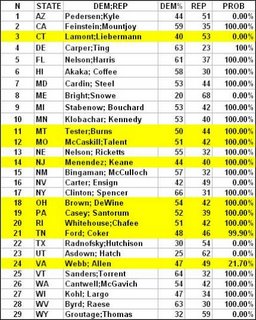Risky Business
Michael Collins at Scoop has a fascinating post, PROTECTING THE DEMOCRATIC VOTE, which everyone should check out. Detailing the results of Monte Carlo simulations of polling data to make election predictions, Collins and Truthisall have produced a number of interesting results that indicate strong majorities for Democrats should be the result of the November elections. Of course, we know that won't be the case but it has little to do with the accuracy of the polls or these simulations.
In the following chart, they highlight those Senate seats that are likely prime suspects for vote fraud. Depsite many of the seats looking to go to Democrats -- by a 100% certainly according the simulation -- the highlighted races are the ones expected to suffer severe "problems" on election day.

Webb is not going to turf out racist idiot Allen, which says far too much -- none of it good -- about Allen's voting soul-mates in Virginia. And, sadly, Connecticut looks to be sporting about as clueless and servile a population of incumbency whores as any in the nation. I also serioulsy doubt that Ford is going to beat Corker at this point, not that Democrats would or should care about that clown getting into the Senate, what with his fevered pitches against pressing issues like gay marriage.
Nonetheless, there are 6 senate seats that the simulation predicts are in the bag for Democrats, which would give them the majority in that house. What more is there to say about this other than ... we'll see.
And in case you might think that this election will be all about Diebold and ES&S machines, Greg Palast has already documented the traditional methods of voter fraud and suppression that have been used quite effectively in the last few elections. In 2004, more than 3 million ballots went uncounted:
Like a forensic crime scene investigation unit, we can perform a post mortem starting with the exhumation of more than three million uncounted votes:
- Provisional Ballots Rejected. An entirely new species of ballot debuted nationwide in 2004: the "provisional ballot." These were crucial to the Bush victory. Not because Republicans won this "provisional" vote. They won by rejecting provisional ballots that were cast overwhelmingly in Democratic precincts. The sum of "the uncounted" is astonishing: 675,676 ballots lost in the counties reporting to the federal government. Add in the missing jurisdictions and the un-vote climbs to over a million: 1,090,729 provisional ballots tossed out.
- Spoiled Ballots. You vote, you assume it’s counted. Think again. Your "x" was too light for a machine to read. You didn’t punch the card hard enough and so you "hung your chad." Therefore, your vote didn’t count and, crucially, you’ll never know it. The federal Election Assistance Commission toted up nearly a million ballots cast but not counted. Add in states too shy to report to Washington, the total “spoilage” jumps to a rotten 1,389,231.
- Absentee Ballots Uncounted. The number of absentee ballots has quintupled in many states, with the number rejected on picayune technical grounds rising to over half a million (526,420) in 2004. In swing states, absentee ballot shredding was pandemic.
- Voters Barred from Voting. In this category we find a combination of incompetence and trickery that stops voters from pulling the lever in the first place. There’s the purge of "felon" voters that continues to eliminate thousands whose only crime is VWB — Voting While Black. It includes subtle games like eliminating polling stations in selected districts, creating impossible lines. No one can pretend to calculate a hard number for all votes lost this way any more than you can find every bullet fragment in a mutilated body. But it’s a safe bet that the numbers reach into the hundreds of thousands of voters locked out of the voting booth.
I'm hopeful that many Americans are on to this game and take whatever measures they can to beat the house. Now that a large piece of the population believes that the 2004 election was stolen, perhaps this awareness will make it more difficult this year. We all need to stand up to the gaming of the system and get those votes counted. Good luck.


0 Comments:
Post a Comment
<< Home